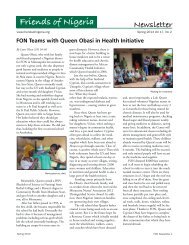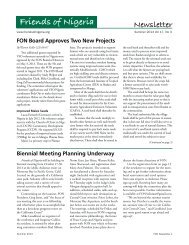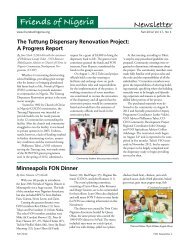NEWSLETTER - Friends of Nigeria
NEWSLETTER - Friends of Nigeria
NEWSLETTER - Friends of Nigeria
Create successful ePaper yourself
Turn your PDF publications into a flip-book with our unique Google optimized e-Paper software.
<strong>Nigeria</strong> news...<br />
(Continued from page 5)<br />
Bird Flu Fears Decline<br />
Three months after Africa’s first cases<br />
were reported in northern <strong>Nigeria</strong>, bird flu<br />
became all but a memory for most<br />
<strong>Nigeria</strong>ns, as the number <strong>of</strong> reported cases<br />
declined. Kano was the worst hit area in<br />
<strong>Nigeria</strong> when the first cases were reported<br />
in February. Tens <strong>of</strong> thousands <strong>of</strong> birds<br />
were culled throughout the state as<br />
veterinary experts and poultry farmers<br />
battled to contain the deadly strain <strong>of</strong> the<br />
virus which can kill humans. The poultry<br />
trade nearly collapsed throughout more<br />
than a third <strong>of</strong> <strong>Nigeria</strong>’s states, as the<br />
panicked public gave up eating chicken.<br />
In mid-May, government <strong>of</strong>ficials<br />
reported that there had been no new<br />
outbreaks in the previous month. And,<br />
while cases had previously been reported<br />
in 13 states in addition to Abuja (as well as<br />
in <strong>Nigeria</strong>’s immediate neighbors<br />
Cameroon and Niger and in nearby<br />
Burkina Faso and Côte d’Ivoire), only<br />
three states continued to have active bird<br />
flu cases-Bauchi, Kano and Kaduna.<br />
However, international experts warned<br />
that it was too soon for <strong>Nigeria</strong>ns to drop<br />
their guard, as this could lead to another<br />
round <strong>of</strong> infections.<br />
By June, the government had paid<br />
about $180,000 compensation to 47<br />
farmers in Kano State, home to about<br />
half <strong>of</strong> the 450,000 birds that had died or<br />
been culled in the country. The farmers<br />
demanded more than the $2 for each<br />
chicken, saying this was just half the<br />
market price, but none <strong>of</strong> the farmers<br />
refused to take the government’s <strong>of</strong>fer.<br />
Some farmers were also unhappy because<br />
the payments only covered those birds<br />
which were killed by the authorities, not<br />
those that died from the disease.<br />
Officials now believe that the flocks <strong>of</strong><br />
migratory birds that flew south to Africa<br />
last fall did not carry the deadly bird flu<br />
virus or spread it during their annual<br />
journey. Specialists from Wetlands<br />
International, deputized by the UN Food<br />
and Agriculture Organization sampled<br />
7,500 African wild birds last winter and<br />
found no A(H5N1). Specialists<br />
increasingly suspect that bird flu in African<br />
countries (in contrast to Europe), was<br />
introduced through imported infected<br />
poultry and poultry products. They<br />
believe that the strength <strong>of</strong> the virus<br />
among wild birds possibly weakened as<br />
the southward migration season<br />
progressed, which probably limited its<br />
spread in Africa. (Sources: BBC, 6/3/06;<br />
New York Times, 5/11/06; IRIN [Kano],<br />
5/15/06).<br />
Gasoline Pipeline Explodes,<br />
Killing About 200<br />
As many as 200 people were burned to<br />
death and dozens <strong>of</strong> others injured on<br />
May 12 in the fishing village <strong>of</strong> Ilado,<br />
about 30 miles east <strong>of</strong> Lagos. Gasoline<br />
gushing from a ruptured pipeline<br />
exploded as villagers scavenged for fuel.<br />
The pipeline, run by the state oil company,<br />
to transport fuel from a depot at the<br />
Lagos port for domestic consumption<br />
inland, was breached at several points.<br />
The preliminary investigation suggested<br />
that the incident was a result <strong>of</strong><br />
vandalization, as more than 70 jerry cans,<br />
long hoses, pliers, nut removers, and<br />
chisels were found at the scene.<br />
Villagers <strong>of</strong>ten tap into pipelines to<br />
steal fuel for cooking or reselling on the<br />
black market. More than 1,000 <strong>Nigeria</strong>ns<br />
have died in recent years from such<br />
pipeline explosions. (Sources: Chicago<br />
Tribune, 5/13/06; IRIN, 5/13/06; New<br />
York Times, 5/13/06, 5/14/06).<br />
At least 43 Killed as Building<br />
Falls<br />
A four-story apartment in central Lagos<br />
collapsed in mid-July, causing 43<br />
confirmed dead and dozens unaccounted<br />
for at the time. The building was reduced<br />
to a pile <strong>of</strong> rubble while the power was<br />
out in the Ebute-Meta district, requiring<br />
volunteers to work through the night with<br />
candles and flashlights, to rescue those still<br />
buried.<br />
Survivors <strong>of</strong> the disaster subsequently<br />
attacked two other properties owned by<br />
the same developer while scavengers<br />
invaded the collapsed structure. One<br />
survivor claimed that an area boy,<br />
pretending to rescue victims, stole<br />
N300,000 from her daughter’s room<br />
before hitting her dead daughter on the<br />
head with a hammer. Journalists<br />
reporting on the tragedy also saw<br />
individuals who claimed to have lost<br />
property removing items such as doors<br />
and window frames, as well as the water<br />
tank from the building.<br />
Residents had questioned the speed<br />
with which the building had been<br />
constructed and alleged that the developers<br />
had bribed the Physical Planning Ministry<br />
<strong>of</strong>ficials. The original approved plan<br />
supposedly stipulated a one-story<br />
building, but the developers added three<br />
floors and a pent house onto the original,<br />
approved plan.<br />
The plot <strong>of</strong> land where the four-story<br />
building used to stand has now been<br />
taken over by the state government for the<br />
construction <strong>of</strong> a public housing project.<br />
Proceeds from the planned project are to<br />
be used for the upkeep <strong>of</strong> the dependents<br />
<strong>of</strong> some <strong>of</strong> the victims <strong>of</strong> the collapsed<br />
building. The state governor also vowed<br />
to confiscate, without compensation to<br />
the owners, all properties in the area with<br />
similar defects. (Sources: Daily Trust<br />
[Abuja], 7/24/06; New York Times, 7/19/<br />
06, 7/20/06; Vanguard [Lagos], 7/26/06).<br />
<strong>Nigeria</strong> is Short-Listed to Host<br />
the 2010 Nations Cup<br />
<strong>Nigeria</strong> is one <strong>of</strong> five countries shortlisted<br />
to host the 2010 Nations Cup, the<br />
continent’s biggest football spectacle. It<br />
believes that it has reinforced its bid by<br />
proposing nine venues for inspection by<br />
the Confederation <strong>of</strong> Africa Football<br />
(CAF) Committee. The proposed venues<br />
include Lagos, Abuja, Warri, Bauchi, Ijebu<br />
Ode, Port Harcourt, Kano, Kaduna and<br />
Enugu. <strong>Nigeria</strong> plans to reduce the<br />
number to six if given the nod by the<br />
CAF Executive Committee. Other<br />
countries short-listed to host the games<br />
include Angola, Equatorial Guinea,<br />
Gabon, and Libya. (Source: This Day<br />
[Lagos], 7/31/06).<br />
(Continued on page 7)<br />
6 FON <strong>NEWSLETTER</strong> www.friends<strong>of</strong>nigeria.org
















